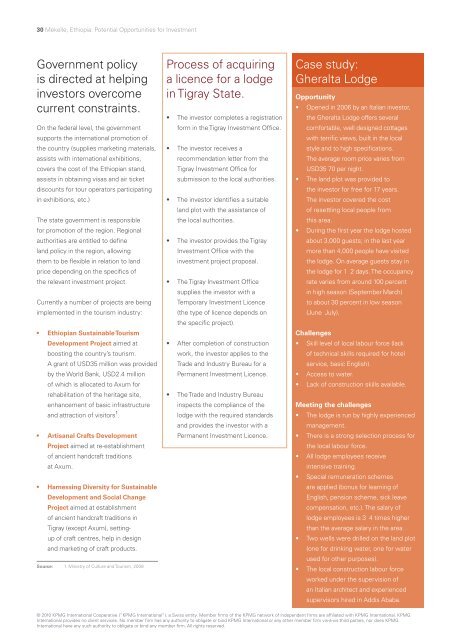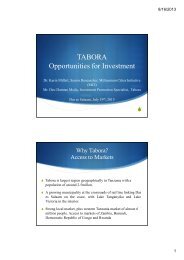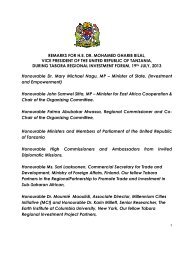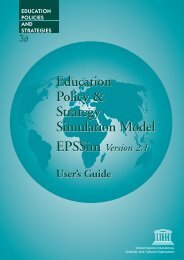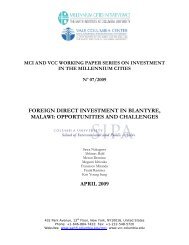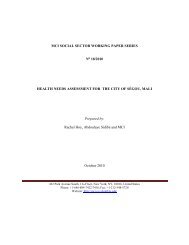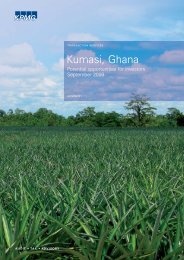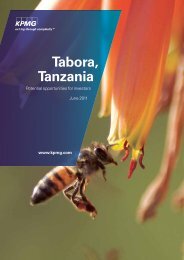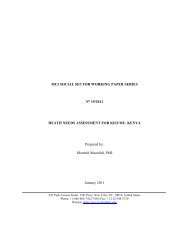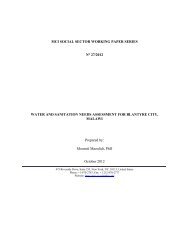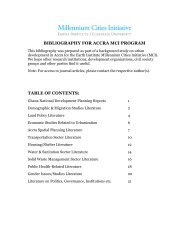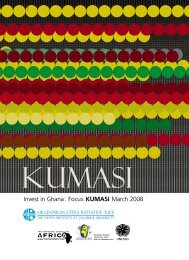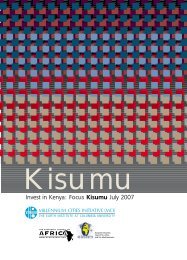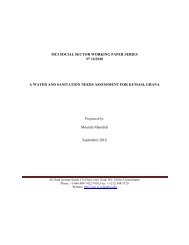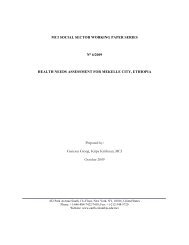Mekelle, Ethiopia - Millennium Cities Initiative - Columbia University
Mekelle, Ethiopia - Millennium Cities Initiative - Columbia University
Mekelle, Ethiopia - Millennium Cities Initiative - Columbia University
You also want an ePaper? Increase the reach of your titles
YUMPU automatically turns print PDFs into web optimized ePapers that Google loves.
30 <strong>Mekelle</strong>, <strong>Ethiopia</strong>: Potential Opportunities for Investment<br />
Government policy<br />
is directed at helping<br />
investors overcome<br />
current constraints.<br />
On the federal level, the government<br />
supports the international promotion of<br />
the country (supplies marketing materials,<br />
assists with international exhibitions,<br />
covers the cost of the <strong>Ethiopia</strong>n stand,<br />
assists in obtaining visas and air ticket<br />
discounts for tour operators participating<br />
in exhibitions, etc.)<br />
The state government is responsible<br />
for promotion of the region. Regional<br />
authorities are entitled to define<br />
land policy in the region, allowing<br />
them to be flexible in relation to land<br />
price depending on the specifics of<br />
the relevant investment project.<br />
Currently a number of projects are being<br />
implemented in the tourism industry:<br />
• <strong>Ethiopia</strong>n Sustainable Tourism<br />
Development Project aimed at<br />
boosting the country’s tourism.<br />
A grant of USD35 million was provided<br />
by the World Bank, USD2.4 million<br />
of which is allocated to Axum for<br />
rehabilitation of the heritage site,<br />
enhancement of basic infrastructure<br />
and attraction of visitors 1 .<br />
• Artisanal Crafts Development<br />
Project aimed at re-establishment<br />
of ancient handcraft traditions<br />
at Axum.<br />
• Harnessing Diversity for Sustainable<br />
Development and Social Change<br />
Project aimed at establishment<br />
of ancient handcraft traditions in<br />
Tigray (except Axum), settingup<br />
of craft centres, help in design<br />
and marketing of craft products.<br />
Source: 1. Ministry of Culture and Tourism, 2009<br />
Process of acquiring<br />
a licence for a lodge<br />
in Tigray State.<br />
• The investor completes a registration<br />
form in the Tigray Investment Office.<br />
• The investor receives a<br />
recommendation letter from the<br />
Tigray Investment Office for<br />
submission to the local authorities.<br />
• The investor identifies a suitable<br />
land plot with the assistance of<br />
the local authorities.<br />
• The investor provides the Tigray<br />
Investment Office with the<br />
investment project proposal.<br />
• The Tigray Investment Office<br />
supplies the investor with a<br />
Temporary Investment Licence<br />
(the type of licence depends on<br />
the specific project).<br />
• After completion of construction<br />
work, the investor applies to the<br />
Trade and Industry Bureau for a<br />
Permanent Investment Licence.<br />
• The Trade and Industry Bureau<br />
inspects the compliance of the<br />
lodge with the required standards<br />
and provides the investor with a<br />
Permanent Investment Licence.<br />
Case study:<br />
Gheralta Lodge<br />
Opportunity<br />
• Opened in 2006 by an Italian investor,<br />
the Gheralta Lodge offers several<br />
comfortable, well -designed cottages<br />
with terrific views, built in the local<br />
style and to high specifications.<br />
The average room price varies from<br />
USD35 -70 per night.<br />
• The land plot was provided to<br />
the investor for free for 17 years.<br />
The investor covered the cost<br />
of resettling local people from<br />
this area.<br />
• During the first year the lodge hosted<br />
about 3,000 guests; in the last year<br />
more than 4,000 people have visited<br />
the lodge. On average guests stay in<br />
the lodge for 1 –2 days. The occupancy<br />
rate varies from around 100 percent<br />
in high season (September -March)<br />
to about 30 percent in low season<br />
(June –July).<br />
Challenges<br />
• Skill level of local labour force (lack<br />
of technical skills required for hotel<br />
service, basic English).<br />
• Access to water.<br />
• Lack of construction skills available.<br />
Meeting the challenges<br />
• The lodge is run by highly -experienced<br />
management.<br />
• There is a strong selection process for<br />
the local labour force.<br />
• All lodge employees receive<br />
intensive training.<br />
• Special remuneration schemes<br />
are applied (bonus for learning of<br />
English, pension scheme, sick leave<br />
compensation, etc.). The salary of<br />
lodge employees is 3 –4 times higher<br />
than the average salary in the area.<br />
• Two wells were drilled on the land plot<br />
(one for drinking water, one for water<br />
used for other purposes).<br />
• The local construction labour force<br />
worked under the supervision of<br />
an Italian architect and experienced<br />
supervisors hired in Addis Ababa.<br />
© 2010 KPMG International Cooperative (“KPMG International”), a Swiss entity. Member firms of the KPMG network of independent firms are affiliated with KPMG International. KPMG<br />
International provides no client services. No member firm has any authority to obligate or bind KPMG International or any other member firm vis-à-vis third parties, nor does KPMG<br />
International have any such authority to obligate or bind any member firm. All rights reserved.


